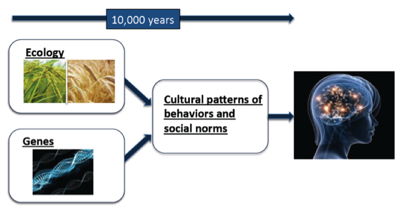New paper on culture and genes
Nov 27, 2015 | Categorized In: Science | Consumer Neuroscience
Shinobu Kitayama, Tony King, Israel Liberzon, and I just had a review paper on the interaction between genes and culture accepted1. I'm not a cultural psychology researcher, and never thought about it much prior to talking to Shinobu. His paper on the relationship between rice and wheat cultivation on the one hand, and culture on the other, really changed how I think about the role of biology and culture.
Briefly, northern China largely relies on wheat-based cultivation, whereas souther China is largely rice-based. There are also pretty profound cultural differences. But up until now nobody bothered to quantitatively link the two and provide some rationale for why they might be connected. You'll have to read their paper for the full story, but for me it makes an incredible amount of sense, and also explains some of the regional stereotypes that every Chinese speaker would know by heart.
 The other benefit of thinking about behavioral consequences of culture is that it allows for a much more mechanistic conceptualization of the effects of genes on culture, which is what our paper discusses. Below is one of the figures from the paper that tries to capture why social scientists interested in culture should care about biology, and why biological researchers should care about culture. Obviously this is incomplete and missing many important details, but given that culture is typically thought of as a nuisance variable in genetic and biological research, this is already an important step forward.
The other benefit of thinking about behavioral consequences of culture is that it allows for a much more mechanistic conceptualization of the effects of genes on culture, which is what our paper discusses. Below is one of the figures from the paper that tries to capture why social scientists interested in culture should care about biology, and why biological researchers should care about culture. Obviously this is incomplete and missing many important details, but given that culture is typically thought of as a nuisance variable in genetic and biological research, this is already an important step forward.
1 Kitayama, Shinobu, Anthony King, Ming Hsu, and Israel Liberzon. “Dopamine-System Genes and Cultural Acquisition: The Norm Sensitivity Hypothesis.” Current Opinion in Psychology.
Briefly, northern China largely relies on wheat-based cultivation, whereas souther China is largely rice-based. There are also pretty profound cultural differences. But up until now nobody bothered to quantitatively link the two and provide some rationale for why they might be connected. You'll have to read their paper for the full story, but for me it makes an incredible amount of sense, and also explains some of the regional stereotypes that every Chinese speaker would know by heart.

1 Kitayama, Shinobu, Anthony King, Ming Hsu, and Israel Liberzon. “Dopamine-System Genes and Cultural Acquisition: The Norm Sensitivity Hypothesis.” Current Opinion in Psychology.